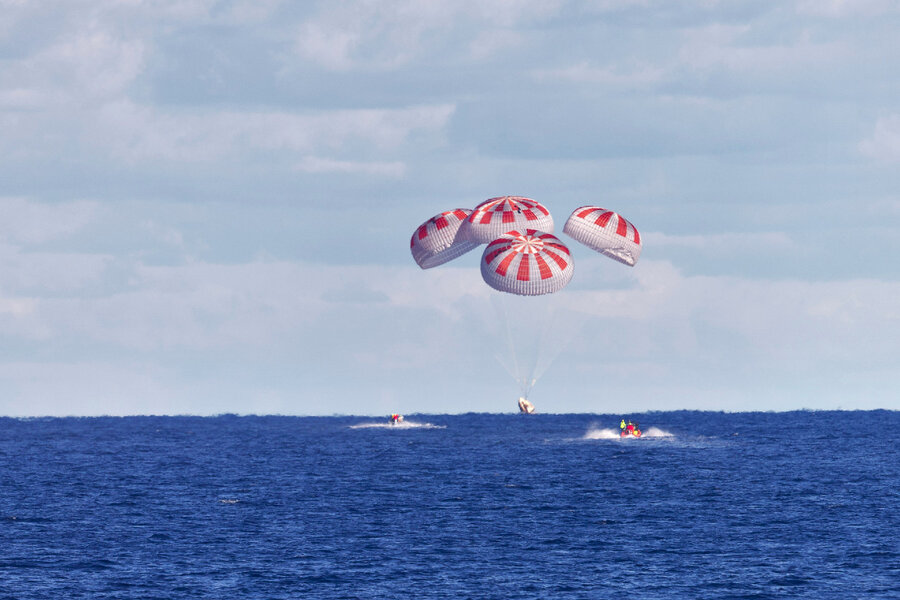SpaceX brings astronauts home, ending historic mission
| Cape Canaveral, Florida
Two NASA astronauts returned to Earth Sunday in a dramatic, retro-style splashdown, their capsule parachuting into the Gulf of Mexico to close out an unprecedented test flight by Elon Musk’s SpaceX company.
It was the first splashdown by U.S. astronauts in 45 years, with the first commercially built and operated spacecraft to carry people to and from orbit. The return clears the way for another SpaceX crew launch as early as next month and possible tourist flights next year.
Test pilots Doug Hurley and Bob Behnken rode the SpaceX Dragon capsule back to Earth less than a day after departing the International Space Station and two months after blasting off from Florida. The capsule parachuted into the calm gulf waters about 40 miles off the coast of Pensacola, hundreds of miles from Tropical Storm Isaias pounding Florida’s Atlantic coast.
“Welcome back to planet Earth and thanks for flying SpaceX,” said Mission Control from SpaceX headquarters.
“It was truly our honor and privilege,” replied Mr. Hurley.
More than an hour after splashdown, the astronauts emerged from their capsule on the deck of a recovery ship, both signaling a thumbs-up as they headed for medical exams.
Their ride home in the capsule dubbed Endeavour was fast, bumpy and hot, at least on the outside.
The spacecraft went from a screaming orbital speed of 17,500 m.p.h. to 350 m.p.h. during atmospheric reentry, and finally to 15 m.p.h. at splashdown. Peak heating during descent was 3,500 degrees Fahrenheit. The anticipated top G forces felt by the crew: four to five times the force of Earth’s gravity.
Within a half-hour of splashdown, the scorched and blistered 15-foot capsule was on board a SpaceX recovery ship with a staff of more than 40, including doctors and nurses. To keep the returning astronauts safe in the pandemic, the recovery crew quarantined for two weeks and were tested for the coronavirus.
Sightseers got too close
The opening of the hatch was held up briefly by extra checks for toxic rocket fumes outside the capsule. After medical exams, the astronauts were expected to fly home to Houston for a reunion with their wives and sons. Mr. Musk was also headed to Texas to meet with them from SpaceX’s Mission Control in California.
Mr. Hurley offered final thanks just before he exited the capsule. “Anybody who’s touched Endeavour, you should take a moment to just cherish the day, especially given all the things that have happened this year.”
There was one unexpected problem: Once the capsule was in the water, private boaters “just made a beeline for it,” and got too close, said NASA Administrator Jim Bridenstine, promising to do better next time at keeping sightseers far away.
The last time NASA astronauts returned from space to water was on July 24, 1975, in the Pacific, the scene of most splashdowns, to end a joint U.S.-Soviet mission known as Apollo-Soyuz. The Mercury and Gemini crews in the early to mid-1960s parachuted into the Atlantic, while most of the later Apollo capsules hit the Pacific. The lone Russian “splashdown” was in 1976 on a partially frozen lake amid a blizzard following an aborted mission; the harrowing recovery took hours.
Gemini and Apollo astronaut Thomas Stafford — the commander of the last crew to splash down — watched the reentry on TV from his Florida home. While pleased with the crew’s safe return, he wasn’t overly impressed. “It’s what we did over 50 years ago,” he said.
SpaceX made history with this mission, which launched May 30 from NASA’s Kennedy Space Center. It was the first time a private company launched people into orbit and also the first launch of NASA astronauts from home turf in nearly a decade. Mr. Hurley came full circle, serving as pilot of NASA’s last space shuttle flight in 2011 and the commander of this SpaceX flight.
President Donald Trump and Vice President Mike Pence, who both watched the launch in Florida, sent congratulations.
“Next era in human spaceflight”
NASA turned to SpaceX and also Boeing to build capsules and ferry astronauts to and from the space station, following the retirement of the shuttles. Until Mr. Hurley and Mr. Behnken rocketed into orbit, NASA astronauts relied on Russian rockets. SpaceX already had experience hauling cargo to the space station, bringing those capsules back to a Pacific splashdown.
“This is the next era in human spaceflight where NASA gets to be the customer,” Mr. Bridenstine said from Johnson Space Center in Houston shortly before the astronauts’ splashdown.
At a press briefing later, Gwynne Shotwell, president of SpaceX, called the mission a springboard to “doing even harder things,” like collaborating on astronaut flights to the moon and then Mars.
“It was an enormous relief after months of anxiety making sure we could bring Bob and Doug back home safely,” Ms. Shotwell said.
SpaceX needs six weeks to inspect the capsule before launching the next crew around the end of September. This next mission of four astronauts will spend a full six months aboard the space station. The Endeavour capsule will be refurbished for another flight next spring. A Houston company run by a former NASA official, meanwhile, has partnered with SpaceX to send three customers to the space station in fall 2021.
Boeing doesn’t expect to launch its first crew until next year. The company encountered significant software problems in the debut of its Starliner capsule, with no one aboard, last year. Its capsules will touch down in the U.S. Southwest desert.
By beating Boeing, SpaceX laid claim to a small U.S. flag left at the space station by Mr. Hurley and the rest of the last shuttle crew. Mr. Musk tweeted his congratulations and a flag emoji followed by “returned.”





